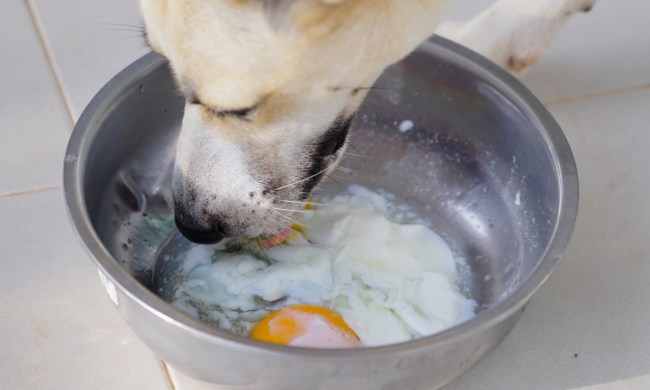It can be distressing for pet parents to see their beloved dog suffering from digestive issues. In fact, dog digestive issues are one of the leading causes of veterinary visits. While many stomach problems share symptoms, such as vomiting and diarrhea, the root cause behind your dog’s stomach upset can range from mild cases of indigestion to potentially life-threatening illnesses. We’ll give you the full scoop on digestive issues in dogs, from what symptoms you need to look out for to what could be causing your pup’s tummy troubles in the first place.

Symptoms of digestive issues
While your pooch probably won’t have every single symptom on our list, you’ll want to keep an eye out for the following symptoms:
- Restlessness
- Loss of appetite
- Abdominal swelling
- Weight loss
- Sudden onset of gas
- Fever
- Nausea, often characterized by drooling or lip licking
- Vomiting
- Diarrhea
- Blood or mucus in stool
- Abdominal pain, usually characterized by whimpering, crying out when touched, a hunched posture, or attempts to keep the abdomen from coming into contact with the floor
Some stomach issues resolve on their own without the need for veterinary intervention, but if your dog is a young pup, a senior, pregnant, or suffering from a chronic illness, it’s better to be safe than sorry. You should also take your dog to the vet right away if his symptoms are severe or accompanied by additional symptoms, such as weakness, lethargy, or fever.
Causes of digestive issues in dogs
Nothing strikes terror into the hearts of pet parents like watching their fur baby vomit. Regardless of the underlying cause, staying calm is your best course of action. Make a note of anything your pup has had to eat or drink, keep tabs on his symptoms, and contact the vet if your dog is ill for longer than 48 hours or experiences severe gastrointestinal distress. Here are some of the most common causes of digestive issues in dogs:

Allergies
A dog who suffers from a food allergy may experience symptoms that run the gamut from sneezing and watery eyes to vomiting and diarrhea. If your pup’s symptoms began after switching him to a new brand of food, it could be a sign of a food allergy, or it could mean you need to spend more time transitioning him to his new formula.
Bloat
The medical term is gastric dilatation-volvulus (GDV), but this potentially fatal condition is more commonly referred to as “bloat.” Bloat can happen if your pup’s stomach twists after filling up with food, gas, or fluid. While bloat can happen in any breed, it’s much more likely to happen in large dogs, with Great Danes being at an estimated 5-8 times higher risk of developing this life-threatening condition.
Cancer
Depending on the type of cancer your pup has, symptoms may range from visible lumps and bumps to vomiting and diarrhea. Unfortunately, many older dogs develop cancer, but the breed most prone to cancer is the much-loved golden retriever. Other high-risk breeds include boxers, cocker spaniels, poodles, German shepherds, and beagles.
Heatstroke
Some dogs are extremely sensitive to heat, putting them at risk of heatstroke when the temperature skyrockets. In addition to panting, heatstroke can cause vomiting. Seniors, young puppies, dogs with health conditions, large breeds, overweight dogs, and breeds with flat faces are especially at risk.
Infection
Both bacterial and parasitic infections can cause nausea and vomiting in dogs. Whenever possible, bring a stool or vomit sample to your vet to aid in the diagnostic process.
Kidney failure
When dogs suffer from kidney failure, a buildup of toxic levels of nitrogen and ammonia may lead to nausea, diarrhea, and vomiting. Kidney failure is relatively common in German shepherds, bull terriers, and cocker spaniels.
Liver failure
Dogs suffering from liver disease can suffer from diarrhea, but the most common symptoms are increased thirst, increased urination, and vomiting. Chihuahuas, poodles, cocker spaniels, Maltese, golden retrievers, and several terrier breeds have a higher risk of developing liver disease than other breeds.
Medication
Some medications can cause stomach upset in dogs. Contact your vet if your pup is currently taking any prescription medication or supplements to see if digestive issues are a known side effect.
Pancreatitis
Dietary indiscretions (eating something he shouldn’t), diabetes, trauma, and a high-fat diet can all cause pancreatitis. However, some breeds, such as miniature schnauzers, toy breeds, and terrier breeds are predisposed to pancreatitis.
Poisoning
Dogs are curious, and sometimes their curiosity leads them to eat toxic foods — and sometimes nonfood items — that can cause digestive issues, seizures, and even heart failure.
Stress
Just like we can occasionally suffer from stress-induced stomach troubles, so can our dogs. A recent move or sudden changes in the family dynamic could be the cause of your pup’s digestive issues.

How to treat your dog’s digestive issues
If your pup experiences vomiting or diarrhea, the first thing you need to do is withhold food for the next 24 hours. In many cases, the problem will resolve on its own. If so, feed your dog a bland diet for the next few days before resuming his usual diet. (Your vet may recommend a diet formulated for sensitive stomachs.) However, if your dog continues to experience digestive issues, it’s a good idea to contact the vet. As always, you should take your pup to the vet immediately if his symptoms are severe.




